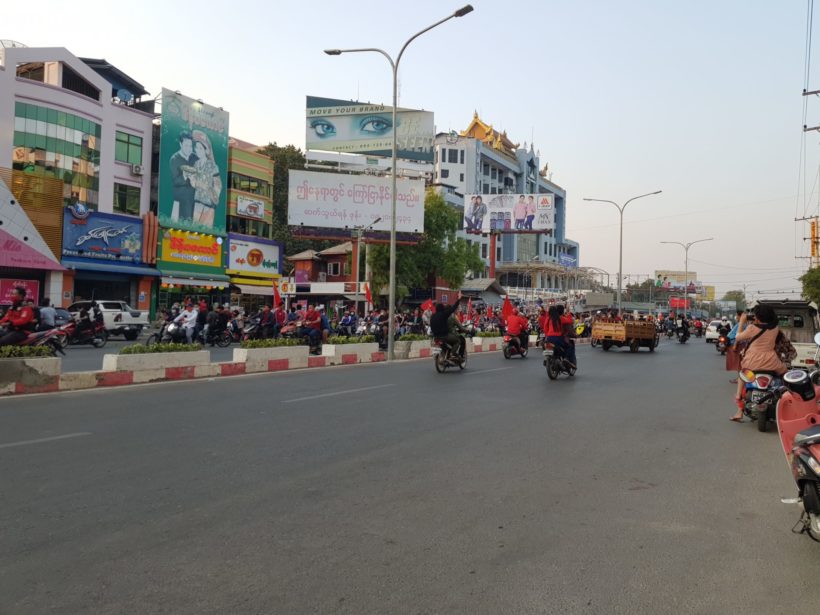PART TWO: MYANMAR AFTER THE COUP
By PEN
Post-Coup Political Crisis
The civil war and military rule have negatively impacted the public health system and socio-economic development. Hospitals and other health care facilities have been occupied, raided, and shot at by Myanmar security forces, health care workers have been arbitrarily beaten and arrested while providing care, and patients have been arrested while receiving treatment in facilities. The military has occupied hospitals and used them as military bases, in direct violation of international humanitarian law. Myanmar security forces have raided and taken medical supplies from private clinics and charity organizations focused on providing voluntary medical and social assistance, including those associated with religious organizations, and has warned them not to provide care to civilian protesters. Humanitarian aid, including medical supplies, to displaced populations, has been blocked by the Myanmar military. The country was devastated by a disastrous third wave of Covid-19 from July to September 2021. Thousands of people died mostly at home, without access to any health care facility or provider due to the collapse of the public health care system and obstruction of health care access (Green and Anonymous, 2022)
The nationwide protests spread not only in cities such as Yangon, Mandalay but also to all rural areas, even villages in every part of the country. Government, NGOs, medical doctors, factory workers, and people from all walks of life participated in the Civil Disobedience Movement (CDM). Many people from Chin state participated in CDM. Right now, the Chin state is the highest participant in CDM in the country. On the following day of the coup, there were anti-coup protest marches in all townships of the Chin state, from early February. In early March, the military troops in Chin state occupied the government hospital, educational institutions and others. The military made warrants for politicians and activists who opposed the coup in early March-April, 2021. Many CDM participants began escaping to Mizoram, India which borders Chin State. The SAC continued to amend the penal code to arrest, detain, and prosecute human rights defenders, activists, journalists, and ordinary people for criticizing the government or the military or for engaging in peaceful protesters. While the SAC amended the Law Protecting the Privacy and Security of Citizens, there was no rule of law in the country. Additionally, the healthcare system collapsed amid the Covid-19 pandemic. Millions of people were facing hunger, and tens of thousands have fled to other parts of Myanmar and neighboring countries like India and Thailand.
Because of the coup, Myanmar has become a war zone. Violence is not limited to the areas on Myanmar’s borders that have large ethnic minority populations but is also occurring in major cities such as Mandalay and Yangon. The widespread violence has led thousands of civilians to flee into different parts of Myanmar and across borders. Ethnic Bamar have enjoyed a privileged position in society and have held a majority of government and military positions. But on the other hand, many ethnic minority groups, have faced systematic discrimination, a lack of economic opportunities and development in their regions, minimal representation in government, and abuses at the hands of the military (Maizland , 2022) since 1962.
In April of 2021, three months after Myanmar’s military took over the country in a coup and replaced the elected government with its State Administration Council (SAC). an attack against Tatmadaw troops by Ethnic Armed Organizations (EAOs) and civilian resistance fighters began in earnest across the country (Ong, 2021).
Living in Fear
Since the coup in 2021, there are widespread fears that the country is slipping toward full-scale civil war and state collapse. The coup has reached human rights violations such as crimes against humanity, including acts of murder, enforced disappearances, persecution, torture, and imprisonment in violation of the fundamental rules of international law (Lilly, 2021). The people of Myanmar have been completely upset. The military has disregarded its citizens, civilians have been living in fear not only in nearby local militias areas and EAOs but also in villages and cities around the country. Anytime, the military can come into civilians’ houses and check as there is no law protecting privacy. They have been targeting villagers and launching indiscriminate attacks through airstrikes and the use of heavy weaponry in populated areas of civilians.
Myanmar has been experiencing food shortages, lack of healthcare personnel across the country, high inflation, cash limits and long lines at banks, and the healthcare system has been struggling to deal with Covid-19. On top of all of that, the military has continued to brutally crack down on the opposition. Some villagers struggled to get food because they did not have jobs and were unable to earn their livelihoods. The SAC military government ordered shops to close temporarily in some areas in Myanmar. Civilians needed medical treatment in several hospitals, but there were limited doctors, and nurses because health workers joined the civil disobedience movement (CDM). Therefore, civilians have been unable to take treatment and medical care from hospitals. Some civilians passed away at home, on their way to cross borders and in internally displaced persons (IDPs) camps. Even the father of the author was suffering from gout diseases and later he was infected by Covid-19 but the SAC military blocked the road from the village to the township. He passed away in the village without taking any medication on February 5, 2022.
Throughout the country, mostly in ethnic minority areas like villages, people were living in fear and struggled to get food, medicine and basic needs. The villagers were not allowed to buy food from towns and cities by the soldiers.
About the author:
PEN. is the pseudonym of a writer who hails from Burma, and has a Bachelor and Master’s degree.






